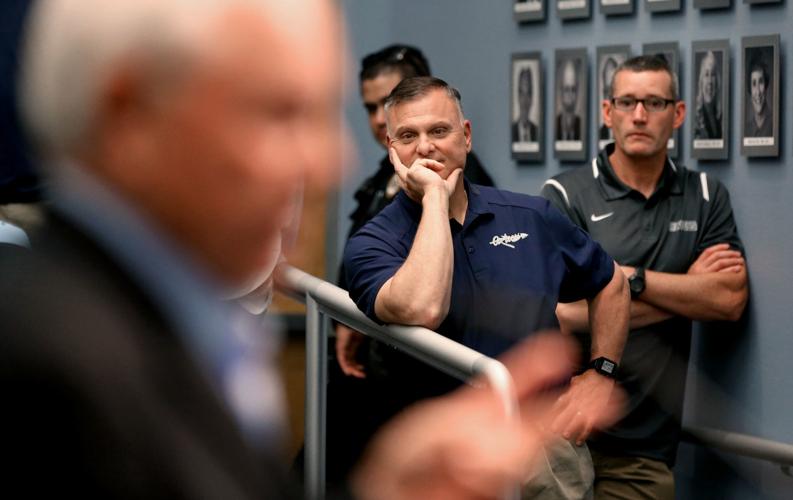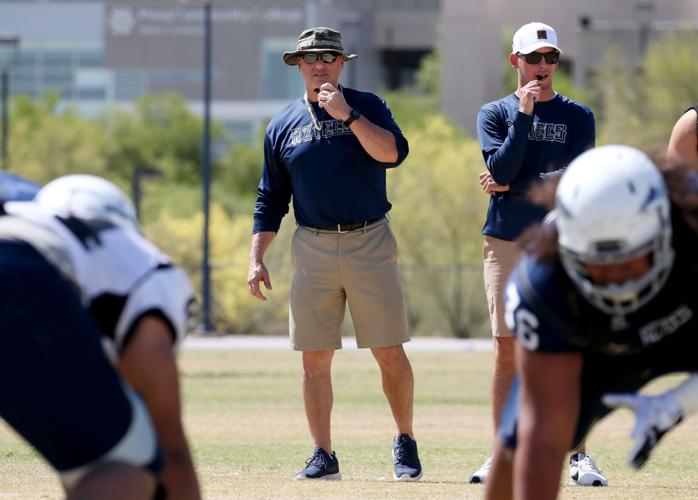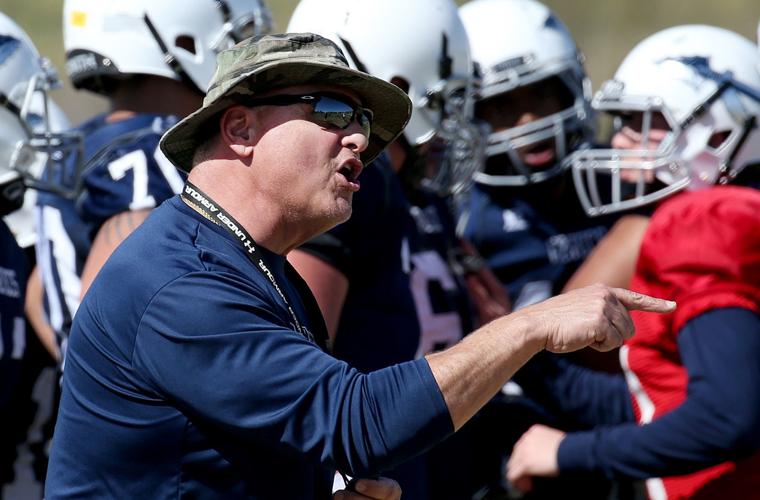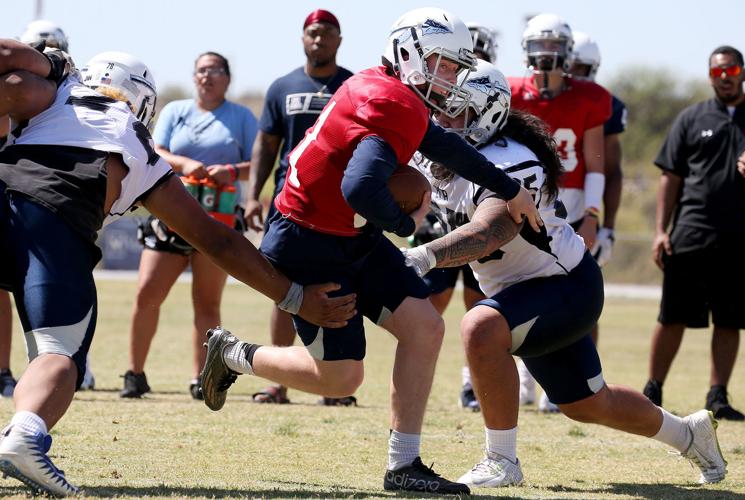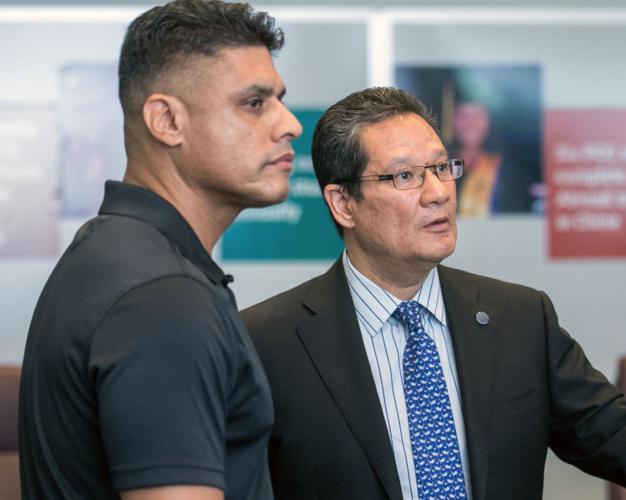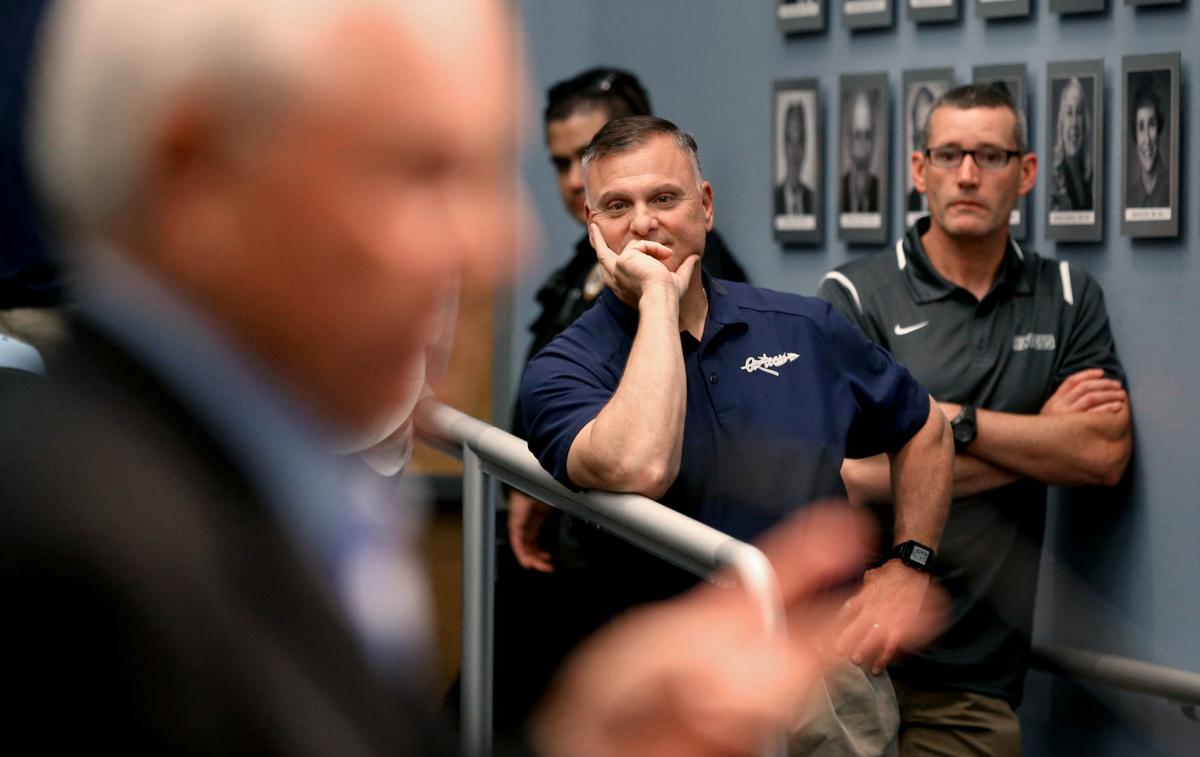On June 13, Pima College chancellor Lee Lambert announced he would be cutting the football program after the 2018 season due to falling enrollment numbers, tighter budgets and Maricopa County’s decision to eliminate the sport — and, therefore, many of the Aztecs’ opponents.
Aztecs coach Jim Monaco did not take the news well: He left the Pima Community College Governing Board meeting before athletic director Edgar Soto and Lambert finished their presentation.
“I left when I started getting all the accolades about what a great job I did, because for three months all we talked about was how bad football was and why we needed to get rid of it — and I didn’t want to hear any of that,” he said.
There’s also this: “I knew what was coming,” Monaco said.
Monaco talked to the Star about the decision to cut football, what’s next for the program and how he’ll try to coach a team with an expiration date. Today marks Part 1 of a two-part series; Part 2 will run in Monday’s paper:

Jim Monaco, center, will lead his program during its final season in 2018. “We’re not going to take a second off,” he said. “We’ve got to win the league and then only God knows from there.”
On cutting football
When we spoke in April, you made it seem like, ‘This isn’t going to happen. We’re still going to have football.’ Between April to a couple weeks ago when they made the decision, did anything change?
A: “Well, obviously. But in all honesty, I can’t tell you what changed because we were given a set of parameters to try to achieve to keep football, and we did that. And then it was one thing after another, try to do this, try to do that and then when it came down to it, they just wanted to drop it. I don’t think anything changed; I just think I wasn’t told which direction they were going in.”
What were the parameters?
A: “A schedule, which we had. We were set. The concussion issue. … Then there was money — they wanted to cut the budget. So I said, ‘Cut the budget, just tell me what I have to fundraise.’ Then it became, ‘Well, we still have to work those numbers out’ to ‘This is what we’re cutting in the budget, so we’re just going to cut football instead of cutting the athletic budget and seeing who could raise money to be able to play.’ They came to me and said, ‘You can raise money for football now, but you have to raise $500,000.’”
So, was there no transparency?
A: “There was no transparency at all. … They’re about as transparent as limo tint.”
What were your feeling at that meeting, seeing how people reacted?
A: “First of all, my staff all wanted to go and I didn’t need them all to go. They had taken enough time away from their families. I knew and they knew — I made them all aware of what was going to happen. I figured, as the head coach, you’re supposed to be there. It’s like the dad, when bad news happens, you don’t run away, you represent your family. That was the same thing, so I was there. I know several people in the community were very upset. My big problem is not enough people were upset. So, it was what it was. And I knew it.”
What kind of outreach did you receive following the announcement?
A: “They had a meeting down at The Kettle on Starr Pass and I-10. … So, they asked me to go and there are people who are mad, but my honest opinion — and I love them for it — I no longer have the time for whatever people want to do. If they want to do (governing board) recall elections and that, God bless them. They’re doing it for me, so how can I be upset? But I have a team I have to be ready to play. And we have to go out and win every quarter, every game, every down, every second we play because, in all honesty, this is it. Unless some miracle happens. We’ve got an amazing team coming in and we’re going to be ready to play. We’re not going to take a second off. It’s kind of like when you’re at the end of your life — you get a death notice and you’ve got six months, people start checking off their bucket list. As a sport, that’s what we have and our bucket list is we’ve got to win the league and then only God knows from there.”

Monaco says being Pima College’s football coach “is the greatest job I have ever had. … And I’ve loved it.”
On the importance
of football
During the most recent board meeting, they didn’t give any numbers for what implications losing football would have on the college. What are your thoughts on how it’s going to affect the college overall?
A: “I’ll give you my opinion from information we’ve obtained since I took over this program. We average at least one person with every student-athlete we bring. We’ve done amazing in Hawaii and … they travel in groups. So, when we get one young man on a scholarship, two or three want to walk on and try and then a girlfriend or a cousin will come and they’re going to school. Of course, somebody’s going to come out and say, ‘You really can’t prove that.’ You know what, we can’t prove that, but if I had the time, we could prove it. We’re probably going to lose close to 400 students by dropping football. And our tuition, people say they do $132,000 in scholarships and spend $480,000. We brought in last year $313,000 in tuition. So, we made almost $200,000 for the college. Now, they’ll say ‘Well we paid 480, you made 300,’ but that’s not counting all the publicity and all this. To run a football program, from coaching salaries to insurance to everything, for $200,000 is a bargain. And in all honesty, and nothing against our other sports — they’re amazing coaches, they’ve done amazing things, I couldn’t have had half the success those guys have had — we still get more press than any sports team here in a good way. Kids moving on, kids being offered, what we’ve done in the community. I just think, alone, the good press we’ve given this school is worth that, but they didn’t. They want to move in another direction.”
They say these budget cuts are due to low enrollment numbers, but by cutting football you’re cutting students. It feels like a vicious cycle. How do you think they’ll be able to get out of that?
A: “I don’t know that. They have all these formulas, which, in my estimation, don’t work because they’ve overspent the budget for the last four years with declining numbers. If I was running my household on those numbers, I’d be bankrupt 15 times. My honest opinion is that they want to move in a different direction. We asked for a dollar increase (per credit hour), which the board said they’d never increase. And then they just increased it. And that dollar would have helped to pay for football, but they wanted to spend it elsewhere.

Quarterback Caleb Ryden finds a hole during the Pima College spring football game in April. The 2018 season will be the Aztecs’ last after PCC officials approved a new $1.9 million annual budget.
“See, that’s where I have a problem. I never have a problem with somebody saying ‘We’re going in this direction and you may not like it, but too bad.’ I can live with that. But I don’t like, ‘We won’t do this and we won’t do that.’ In all honesty, I brought up three meetings ago, when I said ‘I’m not talking any more; this is it,’ that the UA just raised their tuition $33 a credit hour, so I said, ‘We’re still a deal if you raised it even $2.’ The board said they wouldn’t do that. That’s what really aggravated me. … And if they’re really going to do what they swear they’re going to do — cut $5 million a year — what goes next year? What goes the year after next? I brought up three years ago: How come we can’t get something with our football players to get those certificate programs? The NJCAA, you have to be a full-time student. But how can we maybe work something to get a kid a welding degree, to get a kid an automotive degree? Because those kids still make great livings. And, even if you’re a great football player, you may not have the education to be able to move on. Not all of us are brain surgeons and that’s just the way the world works. My mother used to say all the time, ‘Somebody has to drive the bus,’ and I used to get mad at it. But as immigrants, that’s not a bad job. And somebody’s dad is driving a bus. My dad was a janitor. You sit back and ask, ‘How can we help these kids do this?’ But that was never taken.”
In Arizona, it seems there aren’t many universities or colleges available for students to pursue a post-secondary degree while playing sports. Now, Maricopa cut its football programs and Pima cut its program. What message does that send to the local kids?
A: “Honestly, that they’re not important enough. What else could it be? They went after football because it’s the ‘cash cow.’ It takes the most money. Yes, yes it does. It also makes the most money. There are no athletic programs that pay for themselves. Before I ever would have cut this, I would have sat there and said, ‘Hey, how about we add an athletic fee? Might that help eliminate some of the budget?’ I told them: ‘Cut my budget, let me fundraise the rest.’ But instead of cutting the budget across the board, they made it easy and they cut football. Granted, the other coaches, they’re not arguing the fact that they have to go out and fundraise for that, but I said make it accessible to everybody. Football is the biggest chunk, so give me the biggest chunk to fundraise. Volleyball shouldn’t have to raise $100,000, but they could raise $10,000 if that was the percentage they were cut. But they just decided to hack football. Realistically, we could have lowered some scholarships, we could have lowered some expenses. I’m already fundraising. I’ve got my travel budget covered if they wanted to cut my travel that much. They never bothered to ask me. I voiced my opinion, but they never bothered to take it or ask me. I wasn’t included in any of this. OK, the AD is supposed to handle it, but I wasn’t really included in any of it. And if I was, it was just to keep me busy because this has been in the works for a while.

Pima College chancellor Lee Lambert, right, with AD Edgar Soto, announced Aztecs football would end after the 2018 season.
”
What happens to the kids who would play football at Pima? Do you think they will forgo college altogether?
A: “Absolutely! The saddest thing we have here … to many of these families, those $200, $300, $500, $700 of scholarship money is huge because in all honesty we support the underprivileged. This is community college. It’s here for a lot of those reasons. 1) cheaper – you can get undergraduate stuff done at a better price. 2) It gives the underprivileged and the lower socio-economic families an opportunity at a higher education. Most of the young men — African-American, Hispanic — they’re at a tough spot.
“Everybody looks at Tucson and they go, ‘Well, what’s going to happen to our kids?’ You just canned four programs in one of the biggest cities in the United States. What about those kids? Our enrollment could have gone through the roof if we would have kept football because they’re shutting it down in Maricopa. That wasn’t a factor. They didn’t want to hear that. Forget all the people we bring, 120-130 kids a team, you just took opportunities away from 600 kids minimum between Phoenix and Tucson. Six hundred minority men who have already got two strikes and two fouls against them. That’s where this fails. That completely fails because you’re taking education. You may sit there and say, ‘Oh, we’re making Centers of Excellence.’ So, what are you telling all those people? Listen, I’m the first one. My family of immigrants, in Boston, I know tons of people who are Italians who own construction companies that are now filthy rich. So, there’s nothing wrong with being an electrician or a plumber or all that. It’s wonderful, but you’re basically telling them, ‘This is your opportunity now. If you want to be a doctor, figure it out. If you want to be a lawyer, figure it out. If you want to be a teacher, figure it out.’ And that’s sad because, as a former police officer for 22 years, those best cops are kids that grew up in cities because they understand, when they talk to people, they knew what it was like to not be the chosen ones. So, you learn how to speak to folks. You might even be tougher, but you’re smarter on the street.
“These kids, to make them teachers, to make them educators, to help keep them in the medical fields — what are you telling them now? That you can’t do this? Sure, you can go to college, but where’s the help?
“The carrot to keep some of these young people is athletics and I don’t believe that football will be the last to go. Not if they have to cut another $10 million after that. I don’t believe that. I think there are other ways around it, but, you know what, the higher-ups are the higher-ups and that’s above my pay grade. So, I just have opinions.”
On the support
he’s received
What do you say to the people who have reached out?
A: “There are a lot of folks out there that gave me a ton of support, and I will never forget that. They have supported our program, they have supported our kids, but all of the young men that have come through this program — especially over the last five years — that have had some incredible success. I got a phone call from Brian Hernandez, who played on that bull team and played at Utah and went on to the league a little bit and now he’s a coach at TCU. He was our offensive coordinator here my first two years. Brian played for me and then came back. He called me yesterday, just upset, and said, ‘You know, coach, if it wasn’t for Pima, I wouldn’t be where I am right now.’ I said to him, ‘Brian, that’s not true. You’re very bright, you’re very good at what you do.’ He’s like, ‘No, coach. It’s because I was back in the college game there, that they took notice of what we did.’ And that’s the thing that hurts the most. Of all these kids you see up here (on the wall), this is just this much. Those kids would never have had this, without (Pima). It’s a shame. I feel bad for those kids. But for all those kids that came here, all those kids that are coming here, I could never be grateful enough. That is the greatest job I have ever had. I’ve been a police officer and you get to help people. But in this job, you get to help — really help — hundreds of kids every single day. And I’ve loved it. And I’ve been blessed to have it. If this is how I have to go out, I’m OK. I’m OK because I’ve lived my dream. I’m going nowhere else. I’m here and I’m done.”


